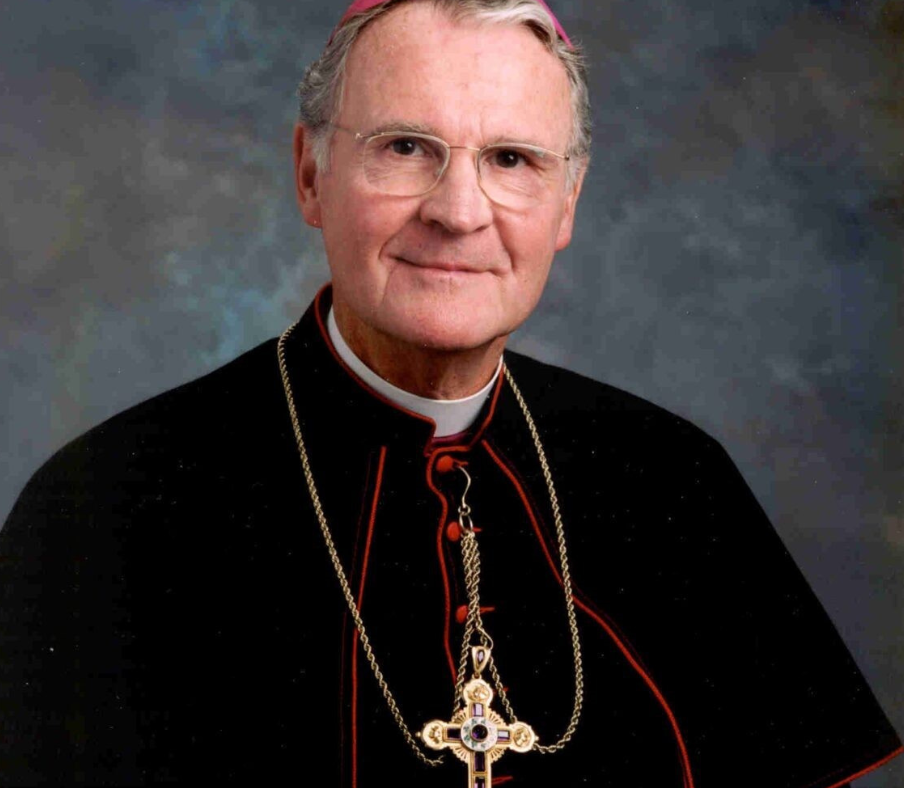
News
Celebrating 65 years as a priest, Archbishop Curtiss raises a song to God
May 24, 2023
“Here’s my cup, Lord.
“I lift it up, Lord.
“Come and quench the thirsting of my soul.
“Bread of Heaven, feed me ‘til I want no more.
“Here’s my cup. Fill it up and make me whole.”
After 65 years as a priest and 47 years as a bishop, Archbishop Emeritus Elden Francis Curtiss is still singing.
The 90-year-old sang “Fill My Cup, Lord” for his fellow priests at a jubilee celebration last month at St. Patrick Parish in Fremont, and again during an interview in his office at the chancery in Omaha.
The archbishop, who led the Archdiocese of Omaha from 1993 to 2009, said his voice isn’t as strong as it once was, but he sings because his heart is full.
“I’m so blessed by the Lord,” he said, “the way He has revealed Himself to me through His Eucharist, and by the priests who have supported me all these years, and the people. I’m so blessed.
“And I’ve still got my marbles,” he said. “I can still think. And I walk, and I exercise still.”
As the archbishop counts his blessings on the 65th anniversary of his ordination to the priesthood, others are counting the ways he has blessed them and the Archdiocese of Omaha.
“I remain inspired by Archbishop Curtiss’ love for the Church and his zeal for preaching the Gospel,” said his successor, Archbishop George J. Lucas said, who also celebrates a May 24th anniversary, his 48th year as a priest.
“He has given a beautiful example of remaining active and interested in the life of the archdiocese,” Archbishop Lucas said, “even though he has retired from administrative responsibilities.
“I have learned to count on his personal encouragement for me, as well as on his daily prayers for me and for the archdiocese.”
FIRM YET JOYFUL
Michael F. Lawler, who retired as executive vice president of finance at Tenaska in Omaha, said he considers Archbishop Curtiss a great priest and a great shepherd.
“I have the utmost respect for him and what he’s done for the archdiocese,” he said.
During his time as archbishop, “he was firm, no doubt about that,” Lawler said. People knew where he stood on controversial issues.
But at the same time, “he’s a wonderful guy with a great sense of humor,” who enjoys being around people, his friend said.
Father Michael Fitzpatrick – who is now retired but served as judicial vicar and moderator of the curia under Archbishop Curtiss – agreed.
Those who’ve known the archbishop saw his joy from the start, he said, though others may have seen him as gruff and stern.
“You could always joke with him,” Father Fitzpatrick said. “You could always argue. You could possibly change his mind. He didn’t mind little arguments.”
“He really is such a nice guy.”
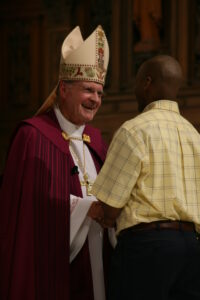
Archbishop Curtiss has always been respectful of others, said Father Eldon McKamy, a retired priest and former chancellor of the archdiocese who also served under Archbishop Curtiss. “I always felt very comfortable talking to him about anything.”
Father Fitzpatrick described the archbishop as personable, and his homilies as “very good and engaging – and short.”
After 14 years of retirement, “he looks no different than he did when he first came” to the archdiocese in 1993, Father Fitzpatrick said. “He’s the same sort of person, only more relaxed because he doesn’t have the weight of the world.”
HIS LEGACY
The archbishop left his stamp on the archdiocese by prioritizing priestly vocations, shoring up Catholic high schools with endowment funding, restoring St. Cecilia Cathedral in Omaha, purchasing a retirement residence for archdiocesan priests and continuing a strong diaconate program.
Vocations were always a No. 1 priority for Archbishop Curtiss, Father Fitzpatrick said.
Father Richard Gabuzda, director of programs and mission at the Institute for Priestly Formation in Omaha, said Archbishop Curtiss was supportive of the institute at its founding in 1995 and has been ever since.
“He just right away understood what we were trying to do. And the rest is history, you might say.”
Through its programs, the institute has helped more than 3,000 seminarians and more than 700 priests grow in holiness. That’s a cause dear to the archbishop, who served as president-rector of Mount Angel Seminary in Oregon before Pope St. Paul VI appointed him bishop of the Diocese of Helena, Montana in 1976.
Archbishop Curtiss – who felt his own calling to the priesthood as early as age 5 – has worked locally, nationally and internationally to boost priestly vocations.
He’s been an episcopal advisor to Serra International and a member of the Ad Hoc Committee for the Implementation of the National Strategy for Vocations for the National Conference of Catholic Bishops, a forerunner to the U.S. Conference of Catholic Bishops.
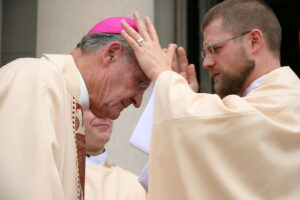
In all his work as archbishop, the support of lay people and a strong diaconate were crucial, Archbishop Curtiss said. “We have 200 deacons, and that’s been great to see that develop.”
His predecessor, the late Archbishop Daniel E. Sheehan, was chairman of the U.S. Bishop’s Committee on the Diaconate. “So he really got it started early here,” Archbishop Curtiss said.
“I inherited a good, strong diaconate program when I came. I appreciated that, and I encouraged it. I was very supportive of the diaconate because I could see the importance, especially with a declining number of priests per capita. The deacons proved to be a very important adjunct ministry.”
OTHER PRIORITIES
The St. John Vianney Residence for retired priests also was a priority for the archbishop, said Father McKamy, who now lives at the Omaha residence, along with Father Fitzpatrick.
“It’s really a beautiful place and the staff is really good,” Father McKamy said.
The 18 or so priests who reside there eat as a community and can watch movies and ball games together, but they also enjoy privacy when they want it.
Lay people live in the building as well, and they and the priests mutually benefit from the arrangement, Archbishop Curtiss said.
“It’s good for both of them,” he said. “It’s good for the priests to have lay people around. It’s good for the laity to have the priests and have Mass every day. … I’ve had the lay people tell me how much they love that.”
As archbishop, a constant challenge was finding enough money to pay for the archdiocese’s many charitable endeavors, Archbishop Curtiss said.
“There’s always a struggle with finances, trying to make sure there’s enough money,” he said.
“We are very much invested in schools here in this archdiocese. To help to encourage income for schools is important. That’s always been a pressure just trying to keep enough money coming in to keep all the ministries going that we have.”
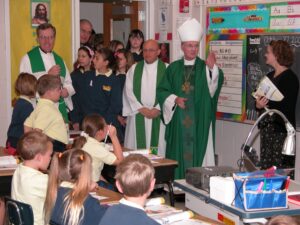
Archbishop Curtiss hit those financial challenges head on soon after he was installed as archbishop in 1993.
“We had some struggles,” he said. “I had a struggle at the Cathedral High School right at the start, which was unfortunate. It had declining numbers and more debt than it needed. Something had to be done. I wanted to strengthen the grade school and strengthen the parish and the archdiocese. So I helped raise some money to get the cathedral on its feet financially.”
Those funds helped pay for the renovations at St. Cecilia Cathedral and boosted endowments at all Catholic high schools in the archdiocese.
Boosting those endowments, Archbishop Curtiss said, was “a joy to me because high schools are expensive propositions to try to keep them going.”
THE SONG CONTINUES
The archbishop remains active as he approaches his 91st birthday on June 16.
About three years ago, a virus cost him the use of one of his biceps “so it’s hard for me to distribute Communion now for any length of time.”
He can still offer Mass and distribute Holy Communion to the ministers at the altar. “But then I sit down because my arm tends to flop after a short time. So I don’t do public distribution of Communion much anymore.”
For the most part, though, he’s healthy and grateful.
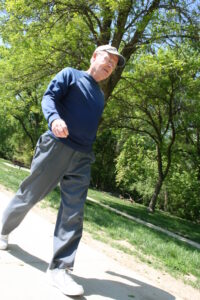
“I’m fortunate to have been able to survive, and most of the time in relatively good health,” Archbishop Curtiss said. “ I’m surrounded by great priests and great people.”
He still sings God’s praises, especially for the gift of the Eucharist.
“It’s been my privilege to say Mass every day, with rare exceptions, to say Mass practically every day since I was ordained a priest.”
“For me, I just can’t live without the Eucharist. It’s been so much a part of my life.”
“I have a chapel at my home with the Blessed Sacrament. When I’m gone for a length of time, I’m glad to celebrate the Eucharist and reserve the Eucharist because then I can feel His Presence in the house and that makes a difference. … That’s a great blessing for me.”